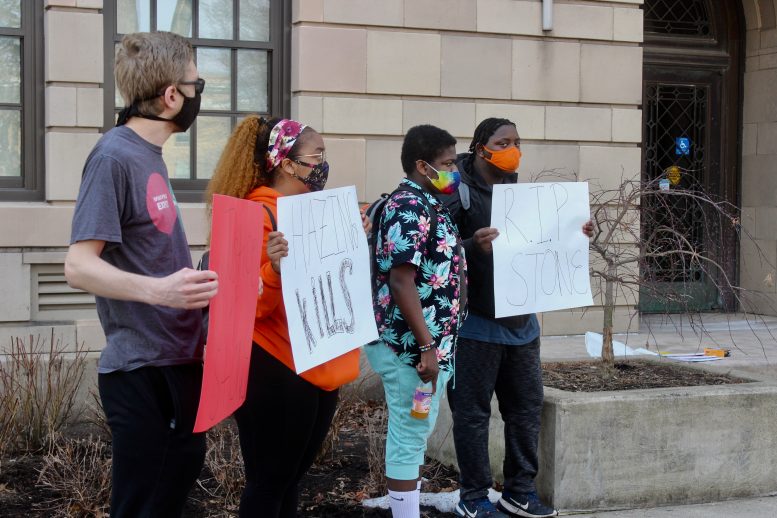By DAVID DUPONT
BG Independent News
About 100 people, mostly students, gathered on the Bowling Green State University campus to remember Stone Foltz.
The 20-year-old sophomore business major died Sunday after being hospitalized Thursday. He was suffering from alcohol poisoning following an alleged hazing by Pi Kappa Alpha members earlier in the evening at an off-campus location.
Bowling Green police are investigating the death.
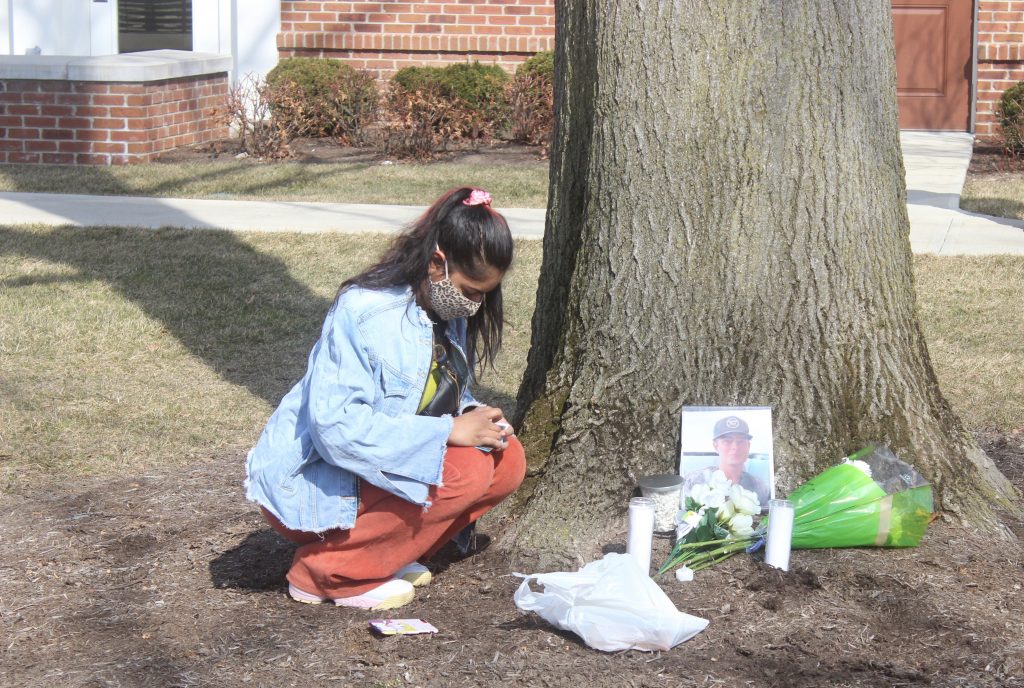
Outside the fraternity’s house on campus people gathered, silently. They were silent said one organizer (who preferred not to be named) because the administration has been silent too long on what is a festering problem.
Another student then placed a photo of Foltz, flowers, candles, and a container of white stones against a tree near the house. The Greek letters had been removed, leaving only the bolts by which they were affixed. The University removed them Sunday morning.
Those marching are demanding that the fraternity’s suspension be made permanent.
That was one of the demands read in front of McFall where the protestors marched quietly after their vigil in the Greek Village.
But before those demands were read, students stood on the steps and made clear, this was not about the death of one student, it about culture that has been perpetuated over the years.
“What happened was not an isolated event,” said Ahmed, an organizer who preferred to go by her last name only. “Things like this happened every weekend. It could have been you. It could have your best friend. It could have been any of us. If we don’t speak up, it will happen again.”
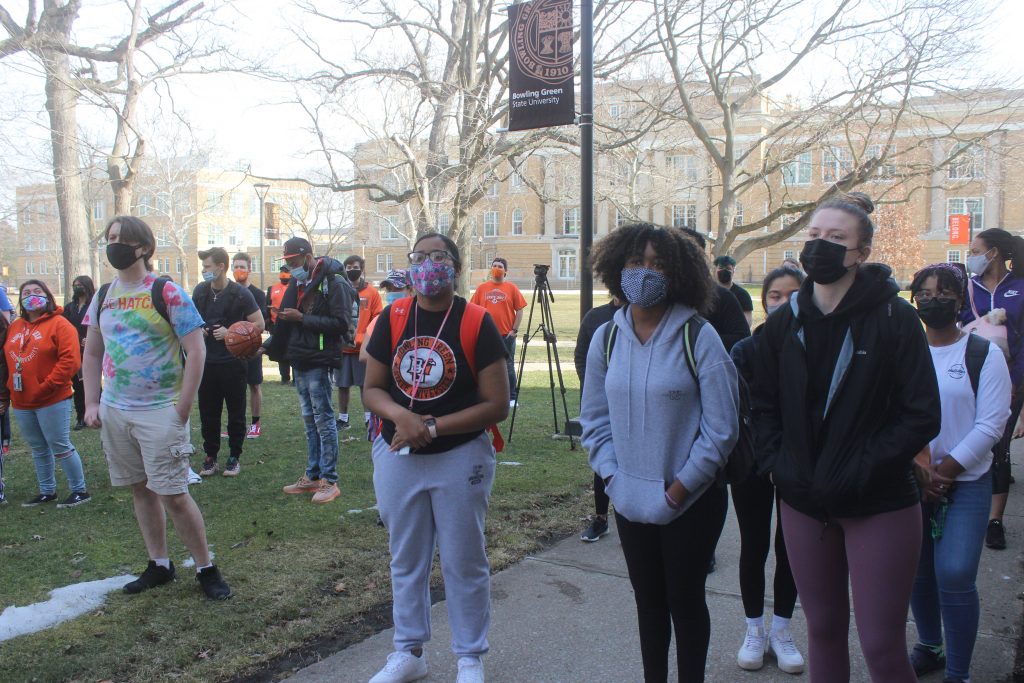
Some, like Artemis Cheeseman, learned about this culture as soon as they stepped onto campus.
Some learned about it before they’d even applied to attend BGSU.
Some learned about it from experience.
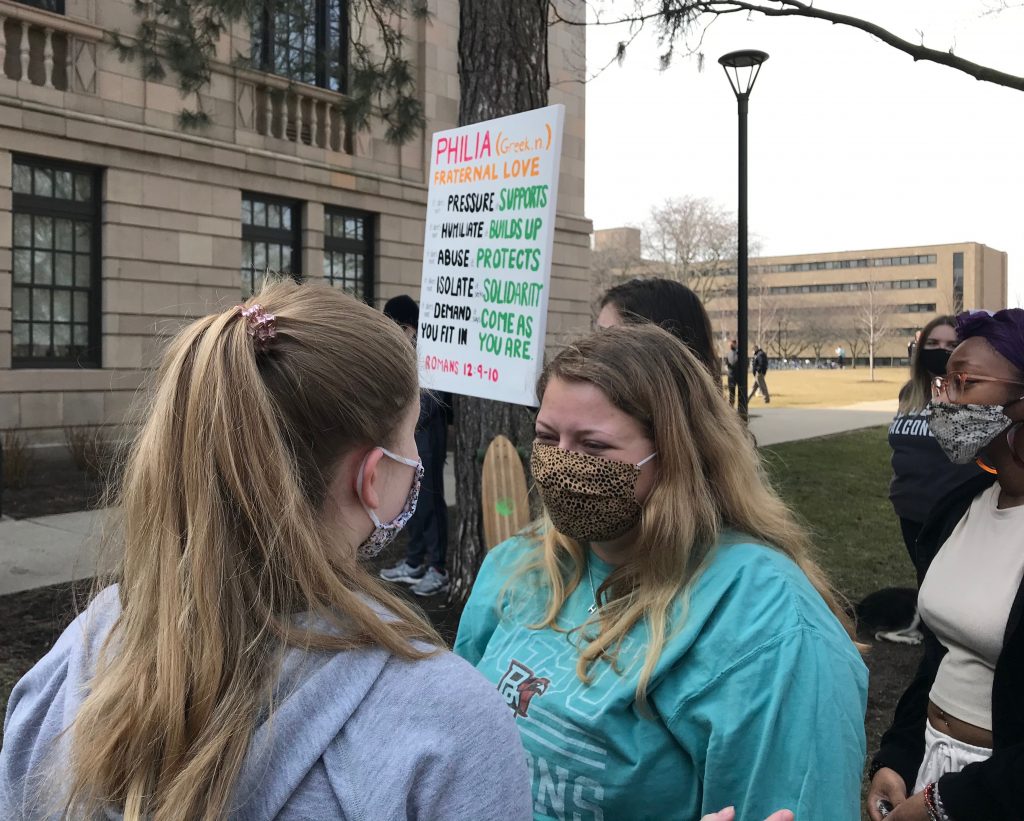
Hope Schneider said she left her sorority over hazing, and has continued to be ostracized and even assaulted by the Greek Community because of criticisms.
She reported the hazing, “but nothing happened.”
She urged others to speak up. “We need to keep pushing, We need to never forget Stone. We need to never forget the people who didn’t speak up. … Don’t stop talking. They can’t silence you.”
Caeli Melland said hazing does not just happen in the Greek system, but in club sports and in other settings. She’s been told of freshmen forced to drink alcohol.
Anthony King said it is a problem within some Black organizations as well, and he emphasized that those victims also need support.
Nareus Hardin said that it didn’t matter that it could happen to you or a friend. Hardin said of Foltz: “I didn’t have to know about him to care about him. … If we’re going to pave our way to the future, we have to say, it happened once and that was one too many times.”
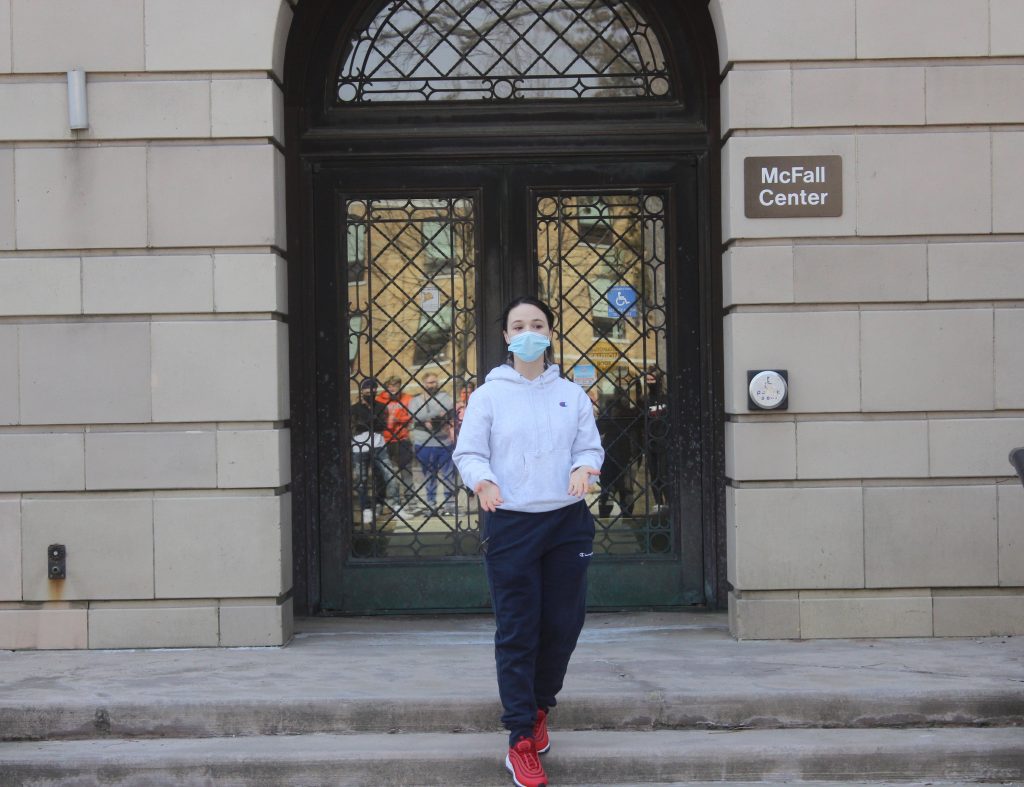
The rally concluded with the reading of a set of demands.
The first was the permanent banning of Pi Kappa Alpha. They want the university to acknowledge this was not an isolated incident and that “the Pi Kappa Alpha Fraternity has caused irreparable harm to members of the BGSU community.”
In fall 2018, the fraternity agreed to a series of sanctions after nine members dressed up as Mexicans and mocked the concept of cultural appropriation on social media.
However, the administration said the actions did not violate the student code of conduct and were within the students’ free speech rights.
The demands also call for the resignation of the university administrator and staff who oversee the Greek system on campus.
The university must publicly take responsibility for the death.
It must also establish a better system for reporting harassment, hazing, assault, and other violations specifically within the office of Fraternity & Sorority Life. “This system needs to involve the victims and objective third parties that have no interest in the preservation of Fraternity & Sorority Life.”
While the marchers noted critically that President Rodney Rogers did not address them, one student said she was told when she called his office that he was on the telephone with Gov. Mike DeWine discussing state action to ban hazing.
A bill, “Collin’s Law: The Ohio Anti-Bullying and Hazing Act,” passed the Ohio House late last year but stalled in the Senate Primary and Secondary Committee. State Rep. Haraz Ghanbari, R-Perrysburg, is a co-sponsor of House Bill 310. The bill strengthens penalties for hazing and bullying.
The bill is named for Collin Wiant who died during a hazing incident at Ohio University in 2018.
Also, the Columbus Dispatch has reported the death of Eli Weinstock, 20, of Bexley. The American University sophomore was found dead of unknown causes in his off-campus residence in Washington D.C. on March 3. He was also a new member of Pi Kappa Alpha.
Police are investigating his cause of death.
BGSU Administration responds
Late Tuesday afternoon BGSU spokesperson Alex Solis released the following statement in response to the protest:
“Nearly 75 students from across our community came together today to grieve the tragic loss of Stone Foltz and peacefully express their voices. Many of them shared personal experiences and concerns.
“We hear them. We support them, and we share in their outrage about the alleged hazing activity from Thursday night. Hazing in any form has no place at BGSU.
“Immediately upon learning of the incident last week, Bowling Green State University placed Pi Kappa Alpha Fraternity on interim suspension. Following that action, we suspended all new member intake processes and on- and off-campus social events for Greek life and also announced plans to work with third parties to conduct a comprehensive review of all student organizations and activities for more accountability and transparency.
“During today’s events, Ohio Gov. Mike DeWine and Ohio Department of Higher Education Chancellor Randy Gardner joined a virtual meeting of the Inter-University Council of Ohio, which included BGSU President Rodney Rogers and all other presidents of all the state’s public universities. BGSU appreciates their deep care and attention to this tragic alleged hazing situation. BGSU also joins statewide support of Collin’s Law, legislation that ensures Ohio is a hazing-free state and elevates severe consequences for those unacceptable actions. We also appreciate the support of our legislative delegation, including Sen. Theresa Gavarone, Rep. Haraz Ghanbari and Rep. D.J. Swearingen of this issue.”

